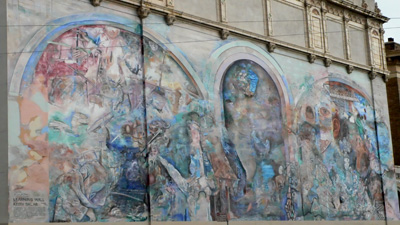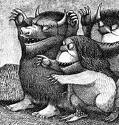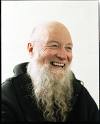 Even the most lighthearted and confident stars of the opera stage suffer from moments of unconscious stress. The bubbly American mezzo-soprano Susan Graham is currently in rehearsals with the Philharmonia Baroque Orchestra for a series of six concerts of the music of Henry Purcell. She’s playing the legendary Queen of Carthage in Dido and Aeneas. The series begins at San Francisco’s Herbst Theatre this Thursday before the artists take off to Palo Alto, Berkeley, Los Angeles and Davis for a couple of weeks.
Even the most lighthearted and confident stars of the opera stage suffer from moments of unconscious stress. The bubbly American mezzo-soprano Susan Graham is currently in rehearsals with the Philharmonia Baroque Orchestra for a series of six concerts of the music of Henry Purcell. She’s playing the legendary Queen of Carthage in Dido and Aeneas. The series begins at San Francisco’s Herbst Theatre this Thursday before the artists take off to Palo Alto, Berkeley, Los Angeles and Davis for a couple of weeks.
Yesterday afternoon, while in conversation with Philharmonia Baroque’s director, Nicholas McGegan, Graham — a propos of nothing it seemed — shared the contents of a nightmare she’d had the night before:
“I had a dream last night that I looked at my contract and it read that I had been engaged to sing not only the role of Dido but three other parts too.” Graham’s smooth, powered brow furrowed slightly at the unsavory recollection. But McGegan quickly ironed out the creases on his leading lady’s face. “No, we’re saving you just for Dido,” he said, patting her shoulder. “There will be no costume changes for you. It’s a one-dress show.”

 The San Francisco Public Schools commission is running a marketing campaign right now. The slogan on posters dotted in bus shelters and elsewhere around town is “The City is Our Classroom.” “That’s all well and good,” I thought as I walked passed a poster on a walk around the neighborhood this morning. “But that doesn’t make up for the fact that classrooms, in the conventional use of the word, aren’t necessarily doing their job anymore in this city.” I was thinking in particular of my recent visit to San Francisco’s rundown School of the Arts (SOTA) (see my
The San Francisco Public Schools commission is running a marketing campaign right now. The slogan on posters dotted in bus shelters and elsewhere around town is “The City is Our Classroom.” “That’s all well and good,” I thought as I walked passed a poster on a walk around the neighborhood this morning. “But that doesn’t make up for the fact that classrooms, in the conventional use of the word, aren’t necessarily doing their job anymore in this city.” I was thinking in particular of my recent visit to San Francisco’s rundown School of the Arts (SOTA) (see my  It’s a wonder that I ever got sent to the US as a technology correspondent for a major British newspaper back in 2000, really. My lack of prowess at — and genuine interest in — figuring out the nuts and bolts of everyday applications I use is not something of which I’m proud. But there’s only so many things I can pay attention to on any given day, and worrying about which format I transfer audio files to and from my laptop sadly isn’t one of them.
It’s a wonder that I ever got sent to the US as a technology correspondent for a major British newspaper back in 2000, really. My lack of prowess at — and genuine interest in — figuring out the nuts and bolts of everyday applications I use is not something of which I’m proud. But there’s only so many things I can pay attention to on any given day, and worrying about which format I transfer audio files to and from my laptop sadly isn’t one of them. Articles about how the recession is affecting the arts in San Francisco are commonplace these days. Janos Gereben’s October 25
Articles about how the recession is affecting the arts in San Francisco are commonplace these days. Janos Gereben’s October 25  In the middle of the San Francisco
In the middle of the San Francisco  It’s a curious and not always desirable thing when an artist becomes so closely identified with one canonical work that the rest of their work gets ignored.
It’s a curious and not always desirable thing when an artist becomes so closely identified with one canonical work that the rest of their work gets ignored. Ukulele virtuoso Jake Shimabukuro has made a name for himself for pushing the ukulele to its aesthetic limits. But is it necessary to push the instrument so far that we don’t get to hear the uke at all? Shimabukuro’s
Ukulele virtuoso Jake Shimabukuro has made a name for himself for pushing the ukulele to its aesthetic limits. But is it necessary to push the instrument so far that we don’t get to hear the uke at all? Shimabukuro’s  A question to all you culture writers and artists out there: How do you cope with the guilt of not getting to experience even a fraction of your city’s arts offerings? It’s an embarrassment of riches.
A question to all you culture writers and artists out there: How do you cope with the guilt of not getting to experience even a fraction of your city’s arts offerings? It’s an embarrassment of riches. Sick of boring standing ovations and polite clapping? Wish audiences would show their feelings about a performance in a more visceral way? The San Francisco-based theatre company
Sick of boring standing ovations and polite clapping? Wish audiences would show their feelings about a performance in a more visceral way? The San Francisco-based theatre company  As every understudy knows, it’s very difficult stepping into a star’s shoes when you know everyone has paid to see someone else in the role — not you.
As every understudy knows, it’s very difficult stepping into a star’s shoes when you know everyone has paid to see someone else in the role — not you. Had an unusual performance experience yesterday which threw up some thoughts about the nature of the exchange that happens between performers and audiences. I was part of a small group of singers drafted under the auspices of a current member of the University of California at San Francisco medical faculty to perform songs for patients on the wards of the university cancer center. I jumped at the chance to sing with this group because I have been interested for a while in the efficacy of arts programs in hospitals and heard great things about the uplifting effect that singing can have on the spirits of people in poor health.
Had an unusual performance experience yesterday which threw up some thoughts about the nature of the exchange that happens between performers and audiences. I was part of a small group of singers drafted under the auspices of a current member of the University of California at San Francisco medical faculty to perform songs for patients on the wards of the university cancer center. I jumped at the chance to sing with this group because I have been interested for a while in the efficacy of arts programs in hospitals and heard great things about the uplifting effect that singing can have on the spirits of people in poor health. Real sorrow is very hard to pull off on stage or screen. I often think that if you want audiences to feel the weight of a character’s woes as a screen or playwright, you’re usually better off getting them to do something funny, rather than give them a crying scene. It’s just really hard to act sadness convincingly. Even if we can see that a character is deeply upset about something, it’s a rare actor who can make us actually feel their pain.
Real sorrow is very hard to pull off on stage or screen. I often think that if you want audiences to feel the weight of a character’s woes as a screen or playwright, you’re usually better off getting them to do something funny, rather than give them a crying scene. It’s just really hard to act sadness convincingly. Even if we can see that a character is deeply upset about something, it’s a rare actor who can make us actually feel their pain.